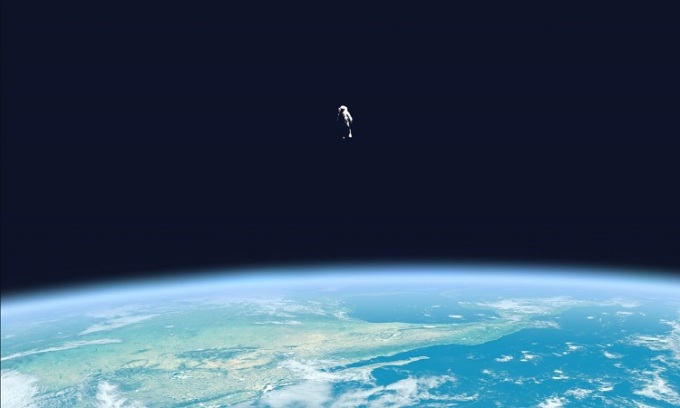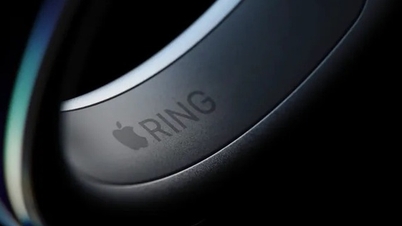The human body will undergo many changes under the influence of a vacuum environment before disappearing into space.

It could take billions of years for the human body to completely disintegrate in the vacuum of space. Photo: Synthex
Let’s say you were ejected from a space station for some reason and you didn’t have a spacesuit or oxygen tank. You were alone in the vacuum of space. You would have to act fast. You wouldn’t have to worry about freezing to death. Space is generally very cold, about -270 degrees Celsius due to the cosmic microwave background radiation. However, the human body is a poor conductor of heat, especially in the vacuum of space. There are three ways to transfer heat from a warm body to the surrounding environment: convection, conduction, and radiation.
Convection is the movement of fluids such as warm air rising. Conduction is the transfer of heat through direct contact, such as when you accidentally touch a hot stove. Radiation is the transfer of energy in the form of electromagnetic waves.
Since there is no air or water around your body, there is no way to transfer heat through convection or conduction, so you can only rely on radiation. The human body typically emits about 100 watts of infrared radiation (about the power of an old light bulb). So it takes a few hours for the body's internal temperature to drop below freezing.
But the cold and vacuum of space will affect you in other, quicker ways. First, any oil or moisture on your skin will quickly evaporate in the vacuum, resulting in nasty frostbite. Despite the vacuum, you won’t explode. Your skin keeps you intact, so your blood won’t boil and your eyes won’t bulge out. Instead, you’ll experience a rare phenomenon called ebullism.
Ebullism occurs when the surface of your skin is exposed to a vacuum. The lower pressure outside your body causes the fluid inside your skin to expand, causing you to bulge. Researchers don't have much experimental evidence of the full effects of ebullism, but in some cases of accidental exposure to vacuum, people have swelled to twice their normal size. But you can survive if you return to a pressurized environment within a few minutes.
The moment you leave the airlock of a space station, you might be tempted to hold your breath to prolong your life, similar to when you go underwater. This is a very bad idea. The problem is that your body (especially your lips, throat, and upper airway) cannot hold a large gulp of air in a vacuum. No matter how hard you try to hold your breath, all the air in your lungs will escape. If you try to hold it, it will escape in a particularly violent and sudden way, causing irreparable damage.
This is the fundamental problem that will kill you. In space, there is no air to breathe. But your brain doesn't know it, at least the part that isn't under your control. Your heart keeps pumping blood. Your circulatory system keeps working. But your lungs are empty.
Blood low in oxygen travels to your lungs, ready to pick up fresh air and transport it throughout your body. Very quickly, blood oxygen saturation drops throughout your body. Realizing the absence of this vital oxygen source, your body immediately goes into a state of alarm. To preserve its most important functions and maintain as much oxygen as possible, your body shuts down the part of your body that consumes the most oxygen: your brain.
Depending on your individual constitution, you will have about 6 to 12 seconds before you lose consciousness and become completely unconscious. That is all the time you have to control and protect your body safely. After that, you can be rescued by someone and restored to a relatively normal state, after taking care of the frostbite and the unknown side effects of ebullism.
Eventually, due to lack of oxygen, your vital organs will gradually shut down. Within minutes, you will suffer organ failure and die. What happens next depends on your location in space. If you are in Earth orbit, you will not freeze. Even at that orbit, the sun is 150 million kilometers away, emitting enough radiation to keep your body warm for centuries. Without a planetary atmosphere or spacecraft to protect you, you will be exposed to ultraviolet radiation from the sun, and your skin will gradually burn. If you are in the vacuum of space outside Earth’s orbit or the shadow of some celestial body, your body will gradually cool. Eventually, your body temperature will equalize with the cold surroundings.
With your frozen body covered in ice crystals, you’ll drift aimlessly between planets. Unless you’re lucky enough to land in some special orbit, you won’t be hit by anything larger than a micrometeorite in the next billion years. However, these micrometeorites will still cause damage, and your body will accumulate numerous small dents from countless impacts, eventually dissolving as the organic molecules disperse and blend into the larger dust belt.
An Khang (According to Popular Mechanics )
Source link


![[Photo] National Assembly Chairman Tran Thanh Man attends the VinFuture 2025 Award Ceremony](/_next/image?url=https%3A%2F%2Fvphoto.vietnam.vn%2Fthumb%2F1200x675%2Fvietnam%2Fresource%2FIMAGE%2F2025%2F12%2F05%2F1764951162416_2628509768338816493-6995-jpg.webp&w=3840&q=75)




![[Photo] 60th Anniversary of the Founding of the Vietnam Association of Photographic Artists](/_next/image?url=https%3A%2F%2Fvphoto.vietnam.vn%2Fthumb%2F1200x675%2Fvietnam%2Fresource%2FIMAGE%2F2025%2F12%2F05%2F1764935864512_a1-bnd-0841-9740-jpg.webp&w=3840&q=75)





































































































Comment (0)